Duiker W.J., Spielvogel J.J. The Essential World History. Volume 1: To 1800
Подождите немного. Документ загружается.

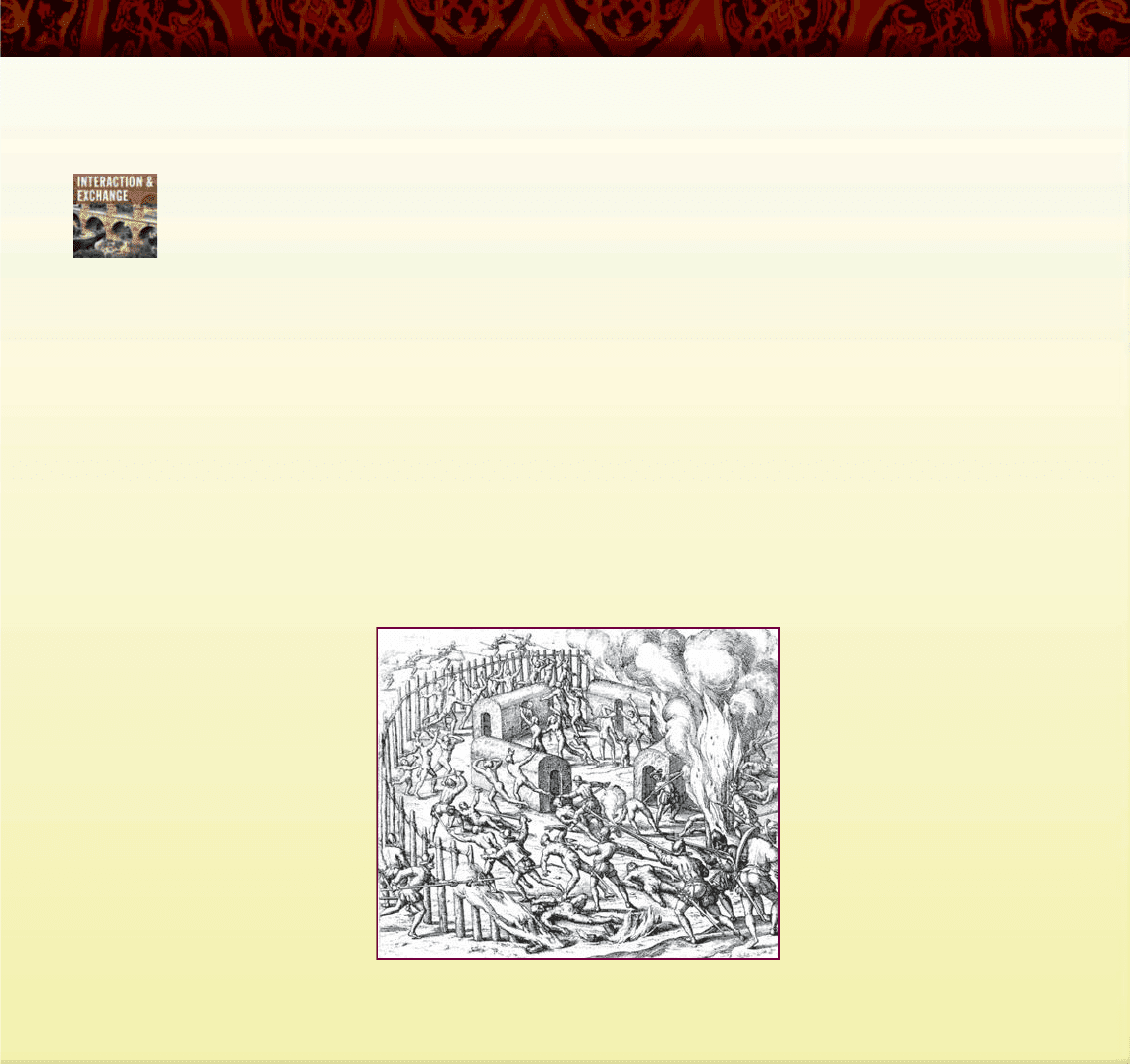
southern tip of South America, crossed the Pacific, and
landed on the island of Cebu in the Philippine Islands.
Although Magellan and some forty of his crew were killed
in a skirmish with the local population, one of the two
remaining ships sailed on to Tidor, in the Moluccas, and
thence around the world via the Cape of Good Hope. In
the words of a contemporary historian, they arrived in
C
adiz ‘‘with precious cargo and fifteen men surviving out
of a fleet of five sail.’’
8
As it turned out, the Spanish could not follow up on
Magellan ’s acc omplishment, and in 1529, they sold their
rights in Tidor to the P ortuguese. But Magellan ’s voyage was
not a total loss. In the absence of concerted resistance from
the local population, the Spanish managed to consolidate
their control ov er the Philippines, which eventually became
a major Spanish base in the carrying trade across the Pacific.
The primary threat to the Portuguese toehold in
Southeast Asia, however, came from the English and
COMPARATIVE ESSAY
T
HE COLUMBIAN EXCHANGE
In the Western world, the discovery of the Ameri-
cas has traditionally been viewed essentially in a
positive sense, as the first step in a process that
expanded the global trade network and eventually
led to economic well-being and the spread of civilization
throughout the world. In recent years, however, that view has
come under sharp attack from some observers, who claim that
for the peoples of the Americas, the primary legacy of the Euro-
pean conquest was not improved living standards but harsh co-
lonial exploitation and the spread of pestilential diseases that
decimated the local population. The brunt of such criticism has
been directed at Christopher Columbus, one of the chief initia-
tors of the discovery and conquest of the Americas. Taking
issue with the prevailing image of Columbus as a heroic figure
in world history, critics view him as a symbol of Spanish colo-
nial repression and a prime mover in the virtual extinction of
the peoples and cultures of the Americas.
There is no doubt that the record of
the European conquistadors in the
Western Hemisphere leaves much to
be desired, and cer tainly the voyages
of Columbus were not of universal
benefit to his contemporaries or to
the generations later to come. They
not only resulted in the destruction
of vibrant civilizations that were
evolving in the Americas but also
led ultimately to the enslavement of
millions of Africans, who were sepa-
rated from their families and
shipped to a new world in condi-
tions of inhuman bestiality.
But to focus solely on the evils
that were committed in the name of
civilization misses a larger point and dis-
torts the historical realities of the era.
The age of European expans ion that began with Prince Henry the
Navigator and Christopher Columbus was only the latest in a series of
population movements that included the spread of nomadic peoples
across Central Asia and the expansion of Islam from the Middle East
after the death of the prophe t Muhammad. In fact, the migration of
peoples in search of survival and a bette r livelihoo d has been a central
theme in the evolution of the human race since the dawn of prehis-
tory. Virtually all of these migrations involved acts of unimaginable
cruelty and the for cible disp lacement of peoples and societies.
Even more important, it seems clear that the consequences of
such population movements are too complex to be summed up in
moral or ideological simplifications. The European expansion into the
Americas, for example, not only brought the destruction of cultures
and the introduction of dangerous new diseases but also initiated
exchanges of plant and animal species that have ultimately been of
widespread benefit to peoples throughout the globe. The introduction
of the horse, cow, and various grain crops vastly increased food pro-
ductivity in the Western Hemisphere. The cultivation of corn, man-
ioc, and the potato, all of them
products of the Americas, have had
the same effect in Asia, Africa, and
Europe.
Christopher Columbus was a
man of his time, with many of the
character traits and prejudices com-
mon to his era. Whether he was
hero or a villain is a matter of de-
bate. That he and his contemporaries
played a key role in the emergence
of the modern world is a matter of
which there can be no doubt.
Q
Why did the expansion of the
global trade network into the
Western Hemisphere have a
greater impact than had previously
occurred elsewhere in the world?
Massacre of the Indians. This sixteenth-century engraving
is an imaginative treatment of what was probably an all-too-
common occurrence as the Spanish attempted to enslave the
American peoples and convert them to Christianity.
Collections of the Library of Congress, USA
344 CHAPTER 14 NEW ENCOUNTERS: THE CREATION OF A WORLD MARKET
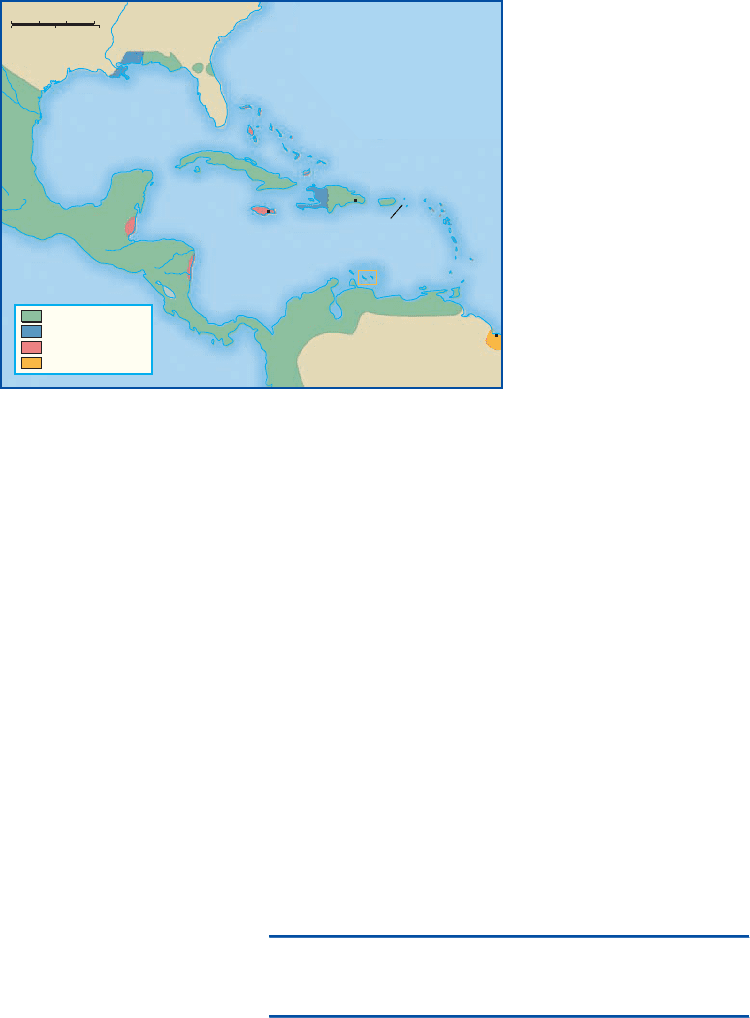
the Dutch. In 1591, the
first English expedition to
the Indies through the
Indian Ocean arrived in
London with a cargo of
pepper. Nine years later, a
private joint-stock com-
pany, the East India
Company, was founded to
provide a stable source of
capital for future voyages.
In 1608, an English fleet
landed at Surat, on the
northwestern coast of In-
dia. Trade with Southeast
Asia soon followed.
The Dutch were quick
to follow suit, and the first
Dutch fleet arrived in
India in 1595. In 1602,
the Dutch East India
Company was established
under government spon-
sorship and was soon
actively com peting with the English and th e Portuguese
in the region.
Europeans in the Amer icas The Dutch, the French, and
the English also began to make inroads on Spanish and
Portuguese possessions in the Americas. War and steady
pressure from their Dutch and English rivals eroded P or-
tuguese trade in both the West and the East, although
Portugal continued to profit from its large colonial empire
in Brazil. A formal administration system had been insti-
tuted in Brazil in 1549, and Portuguese migrants had es-
tablished massive plantations there to produce sugar for
export to the Old World. The Spanish also maintained an
enormous South American empire, but Spain ’s importance
as a commercial power declined rapidly in the seventeenth
century because of a drop in the output of the silver mines
and the poverty of the Spanish mona r ch y.
The Dutch formed their own Dutch West India
Company in 1621 to compete with Spanish and Portu-
guese interests in the Americas. But although it made
some inroads in Portuguese Brazil and the Caribbean (see
Map 14.3), the company’s profits were never large enough
to compensate for the expenditures. Dutch settlements
were also established on the North American continent.
The mainland colony of New Netherland stretched from
the mouth of the Hudson River as far north as present-
day Albany, New York. In the meantime, French colonies
appeared in the Lesser Antilles and in Louisiana, at the
mouth of the Mississippi River.
In the second half of
the seventeenth centur y,
however, rivalry and years
of warfare with the En-
g lish and the Fren ch (who
had also become active in
Nor th America) brought
the decline of the Dutch
commercial empire in the
Americas. In 1664, the
English seized the colony
of New Netherland and
renamed it New York,
andtheDutchWestIndia
Company soon went
bankrupt. In 1663, Can-
ada became the property
of the French crown and
was administered like a
French province. But the
French failed to provide
adequate men or money,
allowing their continental
wa rs to ta ke precedence
over the conquest of the North American continent. By
the early eighteenth century, the French began to cede
some of their American possessions to their Eng lish
rival.
The English, meanwhile, had proceeded to create a
colonial empire along the Atlantic seaboard of North
America. The desire to escape from religious oppression
combined with economic interests made successful col-
onization possible, as the Massachusetts Bay Company
demonstrated. The Massachusetts colony had only 4,000
settlers in its early years, but by 1660, their number had
swelled to 40,000.
Africa in Transition
Q
Focus Question: What were the main features of the
African slave trade, and what effects did European
participation have on traditional African practices?
Although the primary objective of the Portuguese in
rounding the Cape of Good Hope was to find a sea route
to the Spice Islands, they soon discovered that profits
were to be made en route, along the eastern coast of
Africa.
Europeans in Africa
In the early sixteenth century, a Portuguese fleet seized a
number of East African port cities, including Kilwa,
Gulf of
Mexico
Caribbean Sea
Pacific
Ocean
SOUTH AMERICA
CUBA
FLORIDA
BELIZE
JAMAICA
SAINT
DOMINGUE
PUERTO
RICO
TOBAGO
TRINIDAD
Mosquito
Coast
L
e
s
s
e
r
A
n
t
i
l
l
e
s
Margarita
Virgin Is.
HISPANIOLA
Kingston
Stabroek
(Georgetown)
Santo
Domingo
CURAÇAO
G
r
e
a
t
e
r
A
n
t
i
l
l
e
s
M
E
X
I
C
O
LOUISIANA
Atlantic
Ocean
Spanish settlements
French settlements
English settlements
Dutch settlements
0 250 500 Miles
0 250 500 750 Kilometers
MAP 14.3 European Possess ions in the West Indies. After
the first voyage of Christopher Columbus, other European
adventurers followed on his trail, seeking their share of the alleged
riches of the Americas.
Q
WhereelsedidtheFrench,Dutch,andEnglishsettlethat
prov ed more pr ofitable for them?
AFRICA IN TRANSITIO N 345

Sofala, and Mombasa, and built forts along the coast in
an effort to control the trade in the area (see Map 14.2 on
p. 340). Above all, the Portuguese wanted to monopolize
the trade in gold, which was mined by Bantu workers in
the hills along the upper Zambezi River and then shipped
to Sofala on the coast (see Chapter 8). For centuries, the
gold trade had been monopolized by local Bantu-speaking
Shona peoples at Zimbabwe. In the fifteenth century, it
had come under the control of a Shona dynasty known as
the Mwene Metapa. The Portuguese opened treaty rela-
tions with the Mwene Metapa, and Jesuit priests were
eventually posted to the court in 1561. At first, the
Mwene Metapa found the Europeans useful as an ally
against local rivals, but by the end of the sixteenth cen-
tury, the Portuguese had established a protectorate and
forced the local ruler to grant title to large tracts of land
to European officials and private individuals living in the
area. The Portuguese lacked the personnel, the capital,
and the expertise to dominate local trade, however, and
in the late seventeenth century, a vassal of the Mwene
Metapa succeeded in driving them from the plateau; his
descendants maintained control of the area for the next
two hundred years.
The first Europeans to settle in southern Af rica
were the Dutch. After an unsuccessful attempt to seize
the Po rtuguese settlement on the island of Mozambique
off the East African coast, in 1652 the Dutch set up a
way station at the Cape of Good Hope to ser ve as a base
for their fleets en route to the East Indies. At first, the
new settlement was intended simply to provide food
and other supplies to Dutch ships, but eventually it
developed into a permanent colony. Dutch farmers,
known as B oers and speaking a Dutch dialect that
evolved into Afrikaans, began to settle in the sparsely
occupied areas outside the city of Cape Town. The
temperate climate and the absence of tropical diseases
made the territor y near the cape practically the only
land south of the Sahara that the Europeans had found
suitable for habitation.
The Slave Trade
The European exploration of the African coastline had
little apparent significance for most peoples living in the
interior of the continent, except for a few who engaged
in direct or indirect trade with the foreigners. But for
peoples living on or near the coast, the impact was often
great indeed. As the trade in slaves increased during the
sixteenth through the eighteenth centuries, thousands,
and then millions, were removed from their homes
and forcibly exported to plantations in the Western
Hemisphere.
Origins of Sl avery in Africa Traffic in slaves had existed
for centuries before the arrival of Portuguese fleets along
African shores. The primary market for African slaves was
the Middle East, where most were used as domestic
servants. Slavery also existed in many European countries,
where a few slaves from Africa or war captives from the
regions north of the Black Sea were used for domestic
purposes or as agricultural workers in the lands adjacent
to the Mediterranean.
At first, the Portuguese simply replaced European
slaves with African ones. During the second half of the
fifteenth century, about a thousand slaves were taken to
Portugal each year; the vast majority were apparently
destined to serve as domestic servants for affluent families
throughout Europe. But the discovery of the Americas in
the 1490s and the subsequent planting of sugarcane in
South America and the islands of the Caribbean changed
the situation. Cane sugar was native to Indonesia and had
first been introduced to Europeans from the Middle East
during the Crusades. By the fifteenth century, it was
grown (often by slaves from Africa or the region of the
Black Sea) in modest amounts on Cyprus, Sicily, and
southern regions of the Iberian peninsula. But when the
Ottoman Empire seized much of the eastern Mediterra-
nean (see Chapter 16), the Europeans needed to seek out
new areas suitable for cultivation. Demand increased as
sugar gradually replaced honey as a sweetener, especially
in northern Europe.
The primary impetus to the sugar industry came
from the colonization of the Americas. During the six-
teenth century, plantations were established along the
eastern coast of Brazil and on several islands in the Ca-
ribbean. Because the cultivation of cane sugar is an ar-
duous process demanding both skill and large quantities
of labor, the new plantations required more workers than
could be provided by the Indian population in the
Americas, many of whom had died of diseases imported
from Europe and Africa. Since the climate and soil of
much of West Africa were not especially conducive to the
cultivation of sugar, African slaves began to be shipped to
CHRONOL OGY
The Penetration of Africa
Life of Prince Henry the Navigator 1394--1460
Portuguese ships reach the Senegal River 1441
Bartolomeu Dias sails around the tip of Africa 1487
First boatload of slaves to the Americas 1518
Dutch way station established at Cape
of Good Hope
1652
Ashanti kingdom established in West Africa 1680
Portuguese expelled from Mombasa 1728
346 CHAPTER 14 NEW ENCOUNTERS: THE CREATION OF A WORLD MARKET
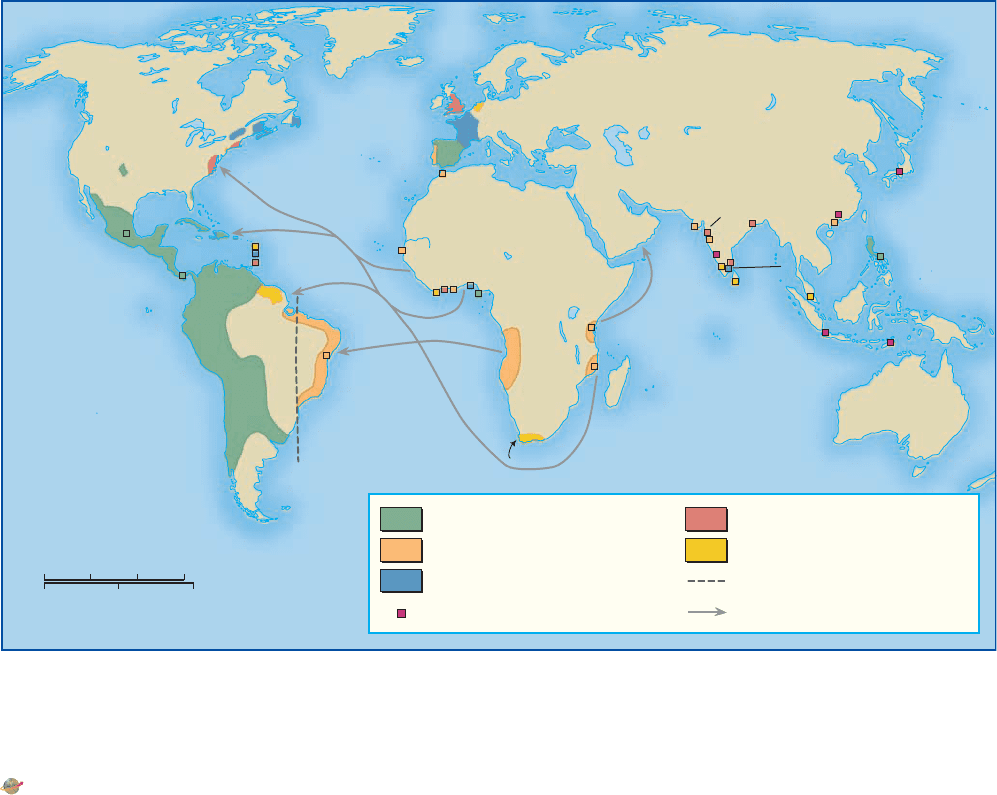
Brazil and the Caribbean to work on the plantations. The
first were sent from Portugal, but in 1518, a Spanish ship
carried the first boatload of African slaves directly from
Africa to the Americas.
Growth of the Slave Trade During the next two cen-
turies, the trade in slaves increased by massive pro-
portions (see Map 14.4). An estimated 275,000 enslaved
Africans were exported to other countries during the
sixteenth century, with 2,000 going annually to the
Americas alone. The tot al climbe d to over a million
during the next century and jumped to six million in the
eighteenth centu ry, when the trade spread from West
and Central Africa to East Africa. It has been estima ted
that altogether as many as ten million Afric an slaves
were transported to the Americas between the early
sixteenth and the late nineteenth centuries. As many as
two million were exported to other areas during the
same period.
The Middle Passage One reason for these astonishing
numbers, of course, was the tragically high death rate. In
what is often called the Middle Passage, the arduous
voyage from Africa to the Americas, losses were frequently
appalling. Although figures on the number of slaves who
died on the journey are almost entirely speculative, during
the first shipments, up to one-third of the human cargo
may have died of disease or malnourishment. Even among
crew members, mortality rates were sometimes as high as
one in four. Later merchants became more efficient and
reduced losses to about 10 percent. Still, the future slaves
were treated in an inhumane manner, chained together in
the holds of ships reeking with the stench of human waste
and diseases carried by vermin.
NEW
SPAIN
PERU
BRAZIL
ANGOLA
CONGO
GOLD COAST
SENEGAMBIA
PORTUGAL
SPAIN
FRANCE
ENGLAND
NETHERLANDS
PERSIA
CHINA
CEYLON
PHILIPPINES
SPICE
ISLANDS
INDONESIA
INDIA
JAPAN
Tenochtitlán
(Mexico City)
Porto Bello
Bahia
Ceuta
Zanzibar
Mozambique
Diu
Bombay
Goa
Calicut
Madras
Colombo
Pondicherry
Cochin
Calcutta
Malacca
Batavia
Timor
Macao
Canton
Manila
Nagasaki
Indian
Ocean
Atlantic
Ocean
Pacific
Ocean
Hispaniola
Cape of
Good Hope
Cape Horn
(Slave-trading
depots)
C
a
r
i
b
b
e
a
n
S
e
a
S
e
n
e
g
a
l
R
.
0 1,500 3,000 Miles
0 1,500 3,000 4,500 Kilometers
Areas under English control
Areas under Dutch control
Tordesillas Demarcation Line
Slave trade routes
Areas under Spanish control
Areas under Portuguese control
Areas under French control
Independent trading cities
MAP 14.4 The Slave Trade. Beginning in the sixteenth century, the trade in African slaves
to the Americas became a major source of profit to European merchants. This map traces the
routes taken by slave-trading ships, as well as the territories and ports of call of European
powers in the seventeenth century.
Q
What were the major destinations for the slave trade?
View an animated version of this map or related maps at www .c engage.com/history/
duikspiel/essentialworld6e
AFRICA IN TRANSITIO N 347
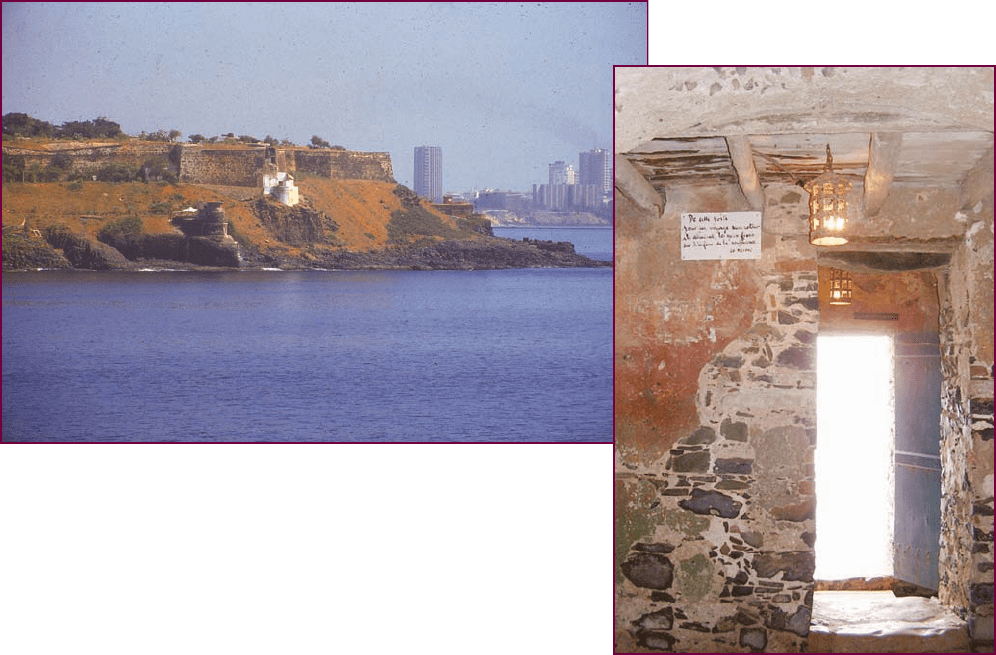
Ironically, African slaves who survived the brutal
voyage fared somewhat better than whites after their ar-
rival. Mortality rates for Europeans in the West Indies, in
fact, were ten to twenty times higher than in Europe, and
death rates for those newly arrived in the islands averaged
more than 125 per 1,000 annually. But the figure for
Africans, many of whom had developed at least a partial
immunity to yellow fever, was only about 30 per 1,000.
The reason for these staggering death rates was clearly
more than maltreatment, although that was cert ainly a
factor. As we have seen, the transmission of diseases fr om
one continent to another br ought high death rates among
those lacking immunity . African slav es were somewh at less
susceptible to E ur opean diseases than the American Indian
populations. Indeed, they seem to have possessed a degree
of immunity, perhaps because their ancestors had devel-
oped antibodies to ‘‘white people’s diseases’’ owing to the
trans-Saharan trade. The Africans would not hav e had
immunity to native American diseases, however.
Sources of Slaves Slaves were obtained by traditional
means. Before the coming of the Europeans in the
fifteenth centur y, most slaves in Africa were prisoners
or war captives or had inherited their status. Many
served as domestic ser vants or as wageless workers for
th e l ocal ruler. Whe n Europeans first began to take part
in the slave trade, they woul d normally purchase slaves
from local African merchants at the infamous slave
markets in exchang e for gold, guns, or other European
manufactured goods such as textiles or copper or iron
utensils (see the box on p. 349). At first, local slave
traders obtained their supply from immediately sur-
rounding regions, but as demand increased, they had to
move farther inland to locate their v ictims. In a few
cases, local rulers became concerned about the impact
of the slave trade on the political and social well-being
of their societies. In a letter to the king of Portugal in
1526, King Affonso of Congo (Bakongo) complained
that ‘‘so great, Sire, is the corruption and licentiousness
that our country is being completely depopulated.’’
9
As
a general rule, however, local monarchs viewed the slave
trade as a source of income, and many launched forays
against defenseless villages in search of unsuspecting
victims.
Gateway to Slavery. Of the 12 million slaves shipped from Africa to other parts of the
world, a good number passed through this doorway (right) on Gor
ee (top), a small island
in a bay just off the coast of Senegal, near Cape Verde. Beginning in the sixteenth century,
European traders began to ship Africans from this region to the Americas to be used as
slave labor on sugar plantations. Some victims were kept in a prison on the island, which
was occupied first by the Portuguese and later by the Dutch, the British, and the French.
Gor
ee also served as an entrepo
ˆ
t and a source of supplies for ships passing along the
western coast of Africa. The sign by the doorway reads, ‘‘From this door, they would
embark on a voyage with no return, eyes fixed on an infinity of suffering.’’
c
William J. Duiker
c
Claire L. Duiker
348 CHAPTER 14 NEW ENCOUNTERS: THE CREATION OF A WORLD MARKET

The Effects of the Slave Trade The effects of the slave
trade varied from area to area. It might be assumed that
apart from the tragic effects on the lives of individual
victims and their families, the practice would have led to
the depopulation of vast areas of the continent. This did
occur in some areas, notably in modern Angola, south of
the Congo River basin, and in thinly populated areas in
East Africa, but it was less true in West Africa. There high
birthrates were often able to counterbalance the loss of
able-bodied adults, and the introduction of new crops
from the Western Hemisphere, such as maize, peanuts,
and manioc, led to an increase in food production that
made it possible to support a larger population. One of the
many cruel ironies of history is that while the institution of
slavery was a tragedy for many, it benefited others.
Still, there is no denying the reality that from a
moral point of view, the slave trade represented a tragic
loss for millions of Africans, not only for the indiv idual
ASLAVE MARKET IN AFRICA
Traffic in slaves had been carried on in Africa since
the kingdom of the pharaohs in ancient Egypt. But
the slave trade increased dramatically after the ar-
rival of European ships off the coast of West Af-
rica. The following passage by a Dutch observer describes a
slave market in Africa and the conditions on the ships that
carried the slaves to the Americas. Note the difference in tone
between this account and the far more critical views expressed
in Chapter 21.
Slavery in Africa: A Firsthand Report
Not a few in our country fondly imagine that parents here sell their
children, men their wives, and one brother the other. But those who
think so deceive themselves, for this never happens on any other ac-
count but that of necessity, or some great crime; most of the slaves
that are offered to us are prisoners of war, who are sold by the
victors as their booty.
When these slaves come to Fida, they are put in prison all to-
gether; and when we treat concerning buying them, they are brought
out into a large plain. There, by our surgeons, whose province it is,
they are thoroughly examined, even to the smallest member, and
that naked too, both men and women, without the least distinction
or modesty. Those that are approved as good are set on one side;
and the lame or faulty are set by as invalids. ...
The invalids and the maimed being thrown out, ...the remain-
der are numbered, and it is entered who delivered them. In the
meanwhile, a burning iron, with the arms or name of the compa-
nies, lies in the fire, with which ours are marked on the breast. This
is done that we may distinguish them from the slaves of the English,
French, or others (which are also marked with their mark), and to
prevent the Negroes exchanging them for worse, at which they have
a good hand.
I doubt not but this trade seems very barbarous to you, but
since it is followed by mere necessity, it must go on; but we take
all possible care that they are not burned too hard, especially the
women, who are more tender than the men.
When we have agreed with the owners of the slaves, they are
returned to their prison. There from that time forward they are kept
at our charge, costing us two pence a day a slave; which serves to
subsist them, like our criminals, on bread and water. To save
charges, we send them on board our ships at the very first opportu-
nity, before which their masters strip them of all they have on their
backs so that they come aboard stark naked, women as well as men.
In this condition they are obliged to continue, if the master of the
ship is not so charitable (which he commonly is) as to bestow
something on them to cover their nakedness.
You would really wonder to see how these slaves live on board,
for though their number sometimes amounts to six or seven hun-
dred, yet by the careful management of our masters of ships, they
are so regulated that it seems incredible. And in this particular our
nation exceeds all other Europeans, for the French, Portuguese and
English slave ships are always foul and stinking; on the contrary,
ours are for the most part clean and neat.
The slaves are fed three times a day with indifferent good vict-
uals, and much better than they eat in their own country. Their
lodging place is divided into two parts, one of which is appointed
for the men, the other for the women, each sex being kept apart.
Here they lie as close together as it is possible for them to be
crowded.
We are sometimes sufficiently plagued with a parcel of slaves
which come from a far inland country who very innocently persuade
one another that we buy them only to fatten and afterward eat
them as a delicacy. When we are so unhappy as to be pestered with
many of this sort, they resolve and agree together (and bring over
the rest to their party) to run away from the ship, kill the Euro-
peans, and set the vessel ashore, by which means they design to free
themselves from being our food.
I have twice met with this misfortune; and the first time proved
very unlucky to me, I not in the least suspecting it, but the uproar
was quashed by the master of the ship and myself by causing the
abettor to be shot through the head, after which all was quiet.
Q
What is the author’s overall point of view with respect to
the institution of slavery? Does he justify the practice? How
does he think Dutch behavior compares with that of other
European countries?
AFRICA IN TRANSITIO N 349
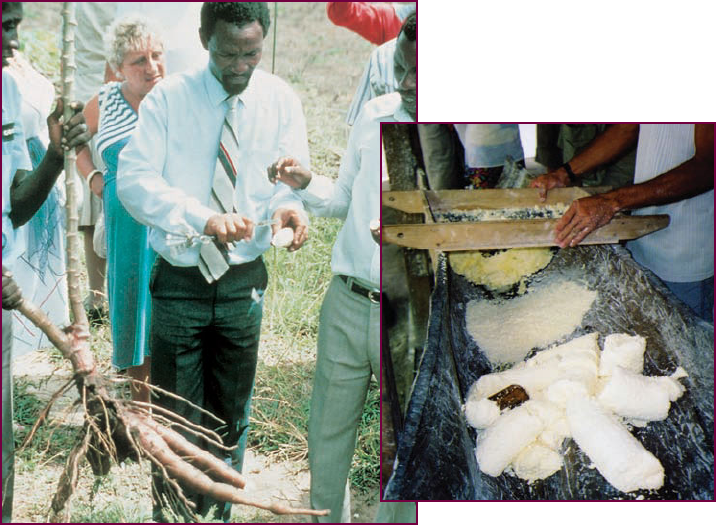
victims, but also for their families. One of the more
poignant aspects of the trade is that as many as 20
percent of those sold to European slavers were chi ldren,
a statistic that may be partly explained by the fact that
many European countries had enacted regulations that
permittedmorechildrenthanadultstobetransported
aboard the ships.
How di d Europeans justify cruelty of such epidemic
proportions? Some ra tionalized that slave traders were
only carrying on a tradition that had existed for cen-
turies throughout the Mediterranean and African
world. In fact, African intermediaries were active in the
process and were often able to dictate the price, volume,
and availab ility of sl aves to European purchasers. Other
Europeans eased their consciences by noting that slaves
brought from Africa would now be exposed to the
Christian faith and would be able to replace American
Indian workers, many of whom were considered too
physically fragile for the heavy human labor involved in
cutting sugarcane.
Political and Social Structures
in a Changing Continent
Of course, the Western economic penetration of Africa
had other dislocating effects. As in other parts of the non-
Western world, the importation of manufactured goods
from Europe undermined the foundations of local cottage
industry and impoverished countless families. The de-
mand for slaves and the introduction of firearms inten-
sified political instability and civil strife. At the same time,
the impact of the Europeans should not be exaggerated.
Only in a few isolated areas, such as South Africa and
Mozambique, were permanent European settlements es-
tablished. Elsewhere, at the insistence of African rulers
and merchants, European influence generally did not
penetrate beyond the coastal regions.
Nevertheless, inland areas were often affected by
events taking place elsewhere. In the western Sahara, for
example, the diversion of trade routes toward the coast
led to the weakening of the old Songhai trading empire
and its eventual conquest by a vigorous new Moroccan
dynasty in the late sixteenth century. In 1590, Moroccan
forces defeated Songhai’s army at Gao, on the Niger River,
and then occupied the great caravan center of Timbuktu.
European influence had a more direct impact along
the coast of West Africa, especially in the vicinity of Eu-
ropean forts such as Dakar and Sierra Leone, but no
European colonies were established there before 1800.
Most of the numerous African states in the area from
Cape Verde to the delta of the Niger River were suffi-
ciently strong to resist Western encroachments, and they
often allied with each other to force European purchasers
to respect their monopoly over trading operations. Some,
like the powerful Ashanti kingdom, established in 1680
on the Gold Coast, profited substantially from the rise in
Manioc, Food for the M illions. One of the plants native to the Americas that
European adventurers would take back to the Old World was manioc (also known as
cassava or yuca). A tuber like the potato, manioc is a prolific crop that grows well in
poor, dry soils, but it lacks the high nutrient value of grain crops such as wheat and
rice and for that reason never became
popular in Europe (except as a source
of tapioca). It was introduced to Africa
in the seventeenth century and
eventually became a staple food for up
to one-third of the population of that
continent. Shown on the left is a
manioc plant in East Africa. On the
right, a Brazilian farmer on the Amazon
River sifts peeled lengths of manioc
into fine grains that will be dried into
flour.
c
William J. Duiker
c
Yvonne Duiker
350 CHAPTER 14 NEW ENCOUNTERS: THE CREATION OF A WORLD MARKET

seaborne commerce. Some states, particularly along the
so-called Slave Coast, in what is now Benin and Togo, or
in the densely populated Niger River delta, took an active
part in the slave trade. The demands of slavery and the
temptations of economic profit, however, also contrib-
uted to the increase in conflict among the states in the
area.
This was especially true in the region of the Congo
River, where Portuguese activities eventually led to the
splintering of the Congo Empire and two centuries of
rivalry and internal strife among the successor states in
the area. A similar pattern developed in East Africa, where
Portuguese activities led to the decline and eventual col-
lapse of the Mwene Metapa. Northward along the coast,
in present-day Kenya and Tanzania, African rulers, as-
sisted by Arab forces from Oman and Muscat in the
Arabian peninsula, expelled the Portuguese from Mom-
basa in 1728. Swahili culture now regained some of the
dynamism it had possessed before the arrival of Vasco da
Gama and his successors. But with much shipping now
diverted southward to the route around the Cape of Good
Hope, the commerce of the area never completely re-
covered and was increasingly dependent on the export of
slaves and ivory obtained through contacts with African
states in the interior.
Southeast Asia in the Era
of the Spice Trade
Q
Focus Question: What were the main characte ristics of
Southeast Asian societies, and how were they affected
by the coming of Islam and the Europeans?
In Southeast Asia, the encounter with the West that began
with the arrival of Portuguese fleets in the Indian Ocean
at the end of the fifteenth century eventually resulted in
the breakdown of traditional societies and the advent of
colonial rule. The process was a gradual one, however.
The Arrival of the West
As we have seen, the Spanish soon followed the Portu-
guese into Southeast Asia. By the seventeenth century, the
Dutch, English, and French had begun to join the
scramble for rights to the lucrative spice trade.
Within a short time, the Dutch, through the ag-
gressive and well-financed Dutch East India Company
(Vereenigde Oost-Indische Compagnie, or VOC), had not
only succeeded in elbowing their rivals out of the spice
trade but had also begun to consolidate their political and
military control over the area. On the island of Java,
where they established a fort at Batavia (today’s Jakarta)
in 1619 (see the illustration on p. 333), the Dutch found
that it was necessary to bring the inland regions under
their control to protect their position. Rather than es-
tablishing a formal colony, however, they tried to rule as
much as possible through the local landed aristocracy. On
Java and the neighboring island of Sumatra, the VOC
established pepper plantations, which soon became the
source of massive profits for Dutch merchants in Am-
sterdam. Elsewhere they attempted to monopolize the
clove trade by limiting cultivation of the crop to one is-
land. By the end of the eighteenth century, the Dutch had
succeeded in bringing almost the entire Indonesian ar-
chipelago under their control.
Competition among the European naval powers for
territory and influence, however, continued to intensify
throughout the region. In the countless island groups
scattered throughout the Pacific Ocean, native rulers
found it difficult to resist the growing European presence.
The results were sometimes tragic, as indigenous cultures
were quickly overwhelmed under the impact of Western
material civilization, often leaving a sense of rootlessness
and psychic stress in their wake (see the Film & History
feature on p. 352).
The arrival of the Europeans had somewhat less
impact in the Indian subcontinent and in mainland
Southeast Asia, where cohesive monarchies in Burma,
Thailand, and Vietnam resisted foreign encroachment. In
addition, the coveted spices did not thrive on the main-
land, so the Europeans’ efforts there were far less deter-
mined than in the islands. The Portuguese did establish
limited trade relations with several mainland states, in-
cluding the Thai kingdom at Ayuthaya, Burma, Vietnam,
and the remnants of the old Angkor kingdom in Cam-
bodia. By the early seventeenth century, other nations had
followed and had begun to compete actively for trade and
missionary privileges. As was the case elsewhere, the
Europeans soon became involved in local factional dis-
putes as a means of obtaining political and economic
advantages.
In Vietnam, the arrival of Western merchants and
missionaries coincided with a period of internal conflict
among ruling groups in the country. After their arrival in
the mid-seventeenth century, the European powers
characteristically began to intervene in local politics, with
the Portuguese and the Dutch supporting rival factions.
By the end of the century, when it became clear that
economic opportunities were limited, most European
states abandoned their factories (trading stations) in the
area. French missionaries attempted to remain, but their
efforts were hampered by the local authorities, who
viewed the Catholic insistence that converts give their
primary loyalty to the pope as a threat to the legal status
SOUTHEAST ASIA IN THE ERA OF THE SPICE TRADE 351
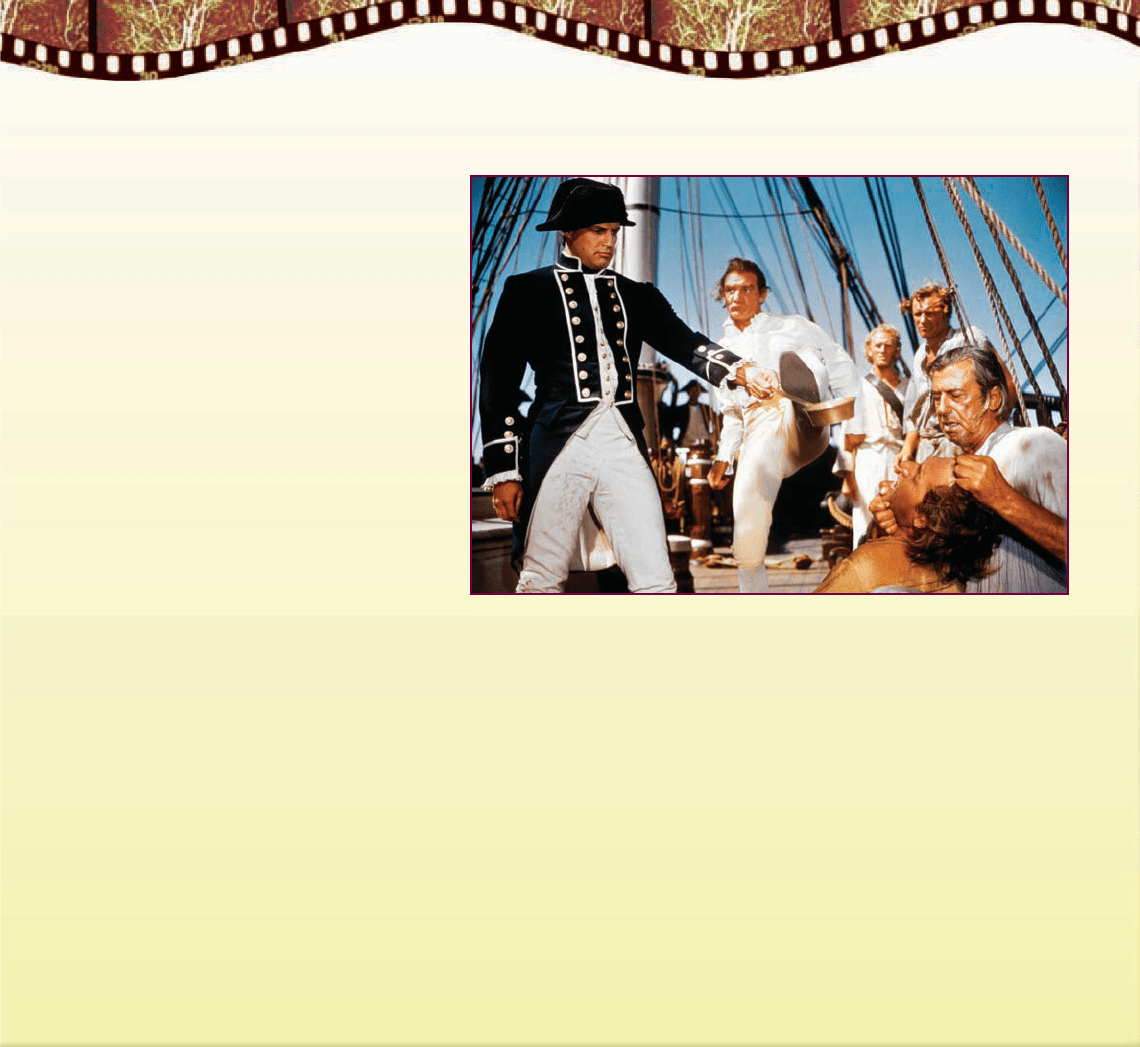
and prestige of the Vietnamese emperor (see the box on
p. 354).
State and Society in Precolonial Southeast Asia
Between 1400 and 1800, Southeast Asia experienced the
last flowering of traditional culture before the advent of
European rule in the nineteenth century. Although the
coming of the Europeans had an immediate and direct
impact in some areas, notably the Philippines and parts of
the Malay world, in most areas Western influence was still
relatively limited.
Nevertheless, Southeast Asian societies were changing
in several subtle ways---in their trade patterns, their means
of livelihood, and their religious beliefs. In some ways,
these changes accentuated the differences between indi-
vidual states in the region. Yet beneath these differences
was an underlying commonality of life for most people.
Despite the diversity of cultures and religious beliefs in
the area, Southeast Asians were in most respects closer to
FILM & HISTORY
M
UTINY ON THE BOUNTY (1962)
The film Mutiny on the Bounty is a dramatic re-
creation of the most famous mutiny in British naval
history. Based on the historical novel by Charles
Nordhoff and James Norman Hall, the film portrays
events that took place during an abortive British
naval mission to the South Pacific in the late eigh-
teenth century. The objective of the mission was to
ship seedlings of the breadfruit tree, an edible tropi-
cal plant, to the island of Jamaica in the Caribbean,
where it was hoped they could be used to feed Afri-
can slaves working on the sugar plantations there.
On one level, the film is the account of a titanic
conflict over authority between Captain William
Bligh---played by veteran British actor Trevor
Howard---and his first mate, Fletcher Christian, por-
trayed by the enigmatic American actor Marlon
Brando. When Bligh’s cruel treatment of his men
leads to unrest, Christian takes command of the
ship, forcing Bligh and his supporters into a small
sloop, where they are left to fend for themselves in
the vast Pacific Ocean.
Behind the tension between two strong person-
alities lies a broader tale of cultural collision between two worlds.
Landing on the South Seas island of Tahiti in 1789, the men of the
Bounty discover a society with a set of customs and beliefs vastly
different from their own. The clash of cultures that ensues, leading
inexorably to the gradual erosion and eventual destruction of Poly-
nesian civilization, is an unspoken subtext of the film. When the
mutineers leave Tahiti to find a new home on the isolated rock
known today as Pitcairn Island, they take several Polynesian men
and women with them to serve their needs, thus perpetuating the
conflict in a new location.
Although the film does not dwell on this aspect of the story,
the end is tragic, as several of the Polynesian islanders---angered at
their treatment at the hands of the mutineers---turn on the latter
and massacre them, almost to the last man. When a European
sailing ship accidentally discovers the island many years later, only
one of the mutineers, along with a new generation of mixed-blood
islanders, remains alive.
The 1962 film version of the book (a previous black-and-white
version had been produced in 1935) has a number of historical
weaknesses. Recent research suggests that Captain Bligh’s treatment
of his men was not exceptional in the context of the time and that
Christian’s role in provoking the mutiny has been underestimated.
More important for our purposes here, the incipient culture clash
between the European sailors and their Tahitian hosts is only hinted
at in the film. Still, Mutiny on the Bounty retains its appeal as a
swashbuckling sea story with dramatic characters set against the
backdrop of a stunning tropical island in the vast emptiness of the
Pacific Ocean.
Captain Bligh (center, Trevor Howard) blocks Fletcher Christian (Marlon Brando, left) from
giving a seaman a drink of water. In the background, Seaman John Mills (Richard Harris),
who will start the mutiny, looks on.
MGM/ The Kobal Collection
352 CHAPTER 14 NEW ENCOUNTERS: THE CREATION OF A WORLD MARKET
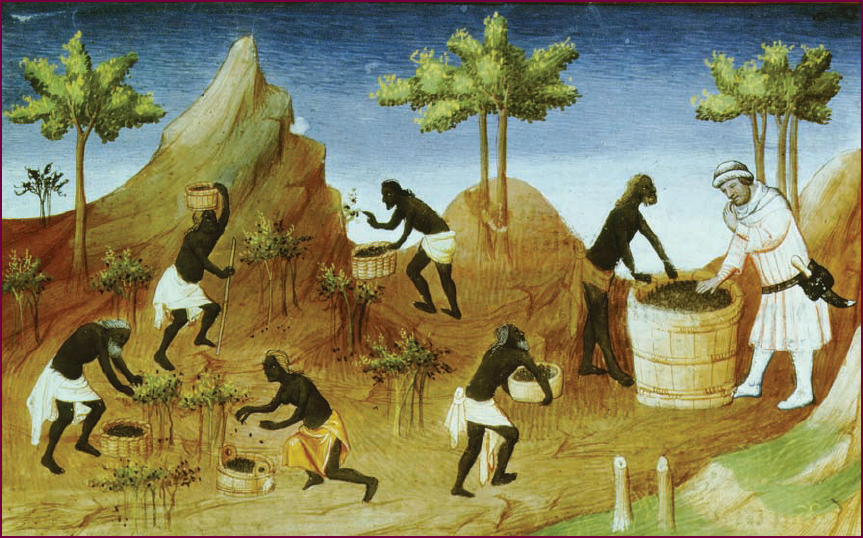
each other than they were to peoples outside the region.
For the most part, the states and peoples of Southeast
Asia were still in control of their own destiny.
Religion and Kingship During the early modern era,
both Buddhism and Islam became well established in
Southeast Asia, and Christianity began to attract some
converts, especially in the Philippines. Buddhism was
dominant in lowland areas on the mainland, from Burma
to Vietnam. At first, Muslim influence was felt mainly on
the Malay peninsula and along the northern coast of Java
and Sumatra, where local merchants encountered their
Muslim counterparts from foreign lands on a regular
basis.
Buddhism and Islam also helped shape Southeast
Asian political institutions. As the political systems began
to mature, they evolved into four main types: Buddhist
kings, Javanese kings, Islamic sultans, and Vietnamese
emperors (for Vietnam, which was strongly influenced by
China, see Chapter 11). In each case, institutions and
concepts imported from abroad were adapted to local
circumstances.
The Buddhist style of kingship took shape between
the eleventh and the fifteenth centuries. It became the
predominant political system in the Buddhist states of
mainland Southeast Asia---Burma, Ayuthaya, Laos, and
Cambodia. Perhaps the dominant feature of the Buddhist
model was the godlike character of the monarch, who was
considered by virtue of his karma to be innately superior
to other human beings and served as a link between
human society and the cosmos.
The Javanese model was a blend of Buddhist and
Islamic political traditions. Like their Buddhist counter-
parts, Javanese monarchs possessed a sacred quality and
maintained the balance between the sacred and the ma-
terial world.
The Islamic model was found mainly on the Malay
peninsula and along the coast of the Indonesian archi-
pelago. In this pattern, the head of state was a sultan, who
was viewed as a mortal, although he still possessed some
magical qualities.
The Economy During the early period of European
penetration, the economy of most Southeast Asian soci-
eties was based on agriculture, as it had been for thou-
sands of years. Still, by the sixteenth century, commerce
was beginning to affect daily life, especially in the cities
that were beginning to proliferate along the coasts or on
A Pepper Plantation. During the Age of Exploration, pepper was one of the spices most desired by
European adventurers. Unlike cloves and nutmeg, pepper could be grown in parts of mainland Asia as well as
in the Indonesian archipelago. Shown here is a French pepper plantation in southern India. Eventually, the
French were driven out of the Indian subcontinent by the British and retained only a few tiny enclaves along
the coast.
c
The Art Archive/Biblioth
eque Nationale, Paris
SOUTHEAST ASIA IN THE ERA OF THE SPICE TRADE 353
